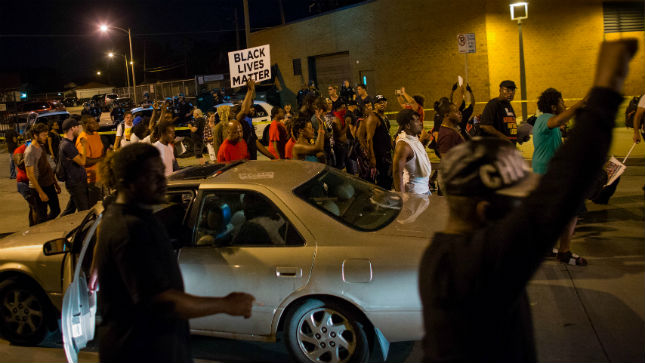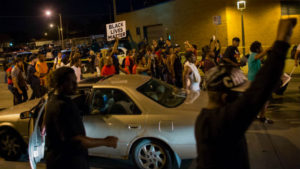Race and faith in America have a checkered past; specifically the Christian faith. Many conservative Christians in the 19th and 20th Centuries were flat out racists, defended slavery and Jim Crow laws, and believed black Americans were inferior. I’m sure in 2016 America 99.99% of conservative Christians, and specifically Evangelicals, believe this was unmitigated evil. But race in America is never simple, and it has never been less simple than it is now.
The heightened focus on race because of the presidency of Barack Obama (not because he is black but because of the racial prism through which he sees the world) is having its own checkered present. So it didn’t surprise me when I read a piece on race by Christianity Today editor, Mark Galli, “Evangelicals and Race—A New Chapter: Why racial justice and reconciliation are now core for the movement.” Galli believes we are in a “God moment”—”when circumstances fall together in a way that suggests God is at work in our lives in a fresh way.” He relates this to other forms of suffering when Christians were awakened to address compelling needs. I will let Galli tell you in his words what he means by this, and then why I disagree with him so strongly.
We are currently experiencing a new “God moment,” when God is shining his burning light on how our nation and our churches are fractured by racial division and injustice. In the past two years, we’ve seen image after image of injustice perpetrated against black Americans. We’ve studied the statistics. And most important, we’ve heard the anguished cry of a suffering community that is understandably hurting, angry, and demanding progress.
Moderate white evangelicals, who make up the bulk of our movement, see more clearly than ever how racism is embedded in many aspects of our society, from business to law enforcement to education to church life. We have been slow to hear what the black church has been telling us for a while. And in all that, we hear God calling his church to seek justice and reconciliation in concrete ways.
Addressing verses that say and imply that there will be no racial divisions in the kingdom of God, Galli says:
We’ve been convicted for neglecting these teachings in ways that have led to subtle and overt acts of racism. We are now struggling to find ways to model what a redeemed, multiethnic and multiracial community looks like before the return of Christ.
He takes a swipe and Donald Trump and his followers claiming that make America great again “unfortunately seems to involve marginalizing those who are not white.” Then he states:
to the extent that they remain deaf about racial injustice and reconciliation as gospel priorities, they do not represent the best of the evangelical tradition. . . .We have a lot to learn about the texture of the racism embedded in our culture and our churches.
I’ve taught my children as they’ve grown up to always identify, question, and challenge assumptions. The most glaringly obvious assumption in this piece comes from Galli’s assertions that we have a racism problem in this country. He never describes or defines what this racism is, only that we need to remedy it through “justice and reconciliation.” He assumes we know what this racism is, and that we all agree it is a problem, unless of course you plan to vote for Donald Trump. He goes so far as to assert that even our churches are “fractured by racial division and injustice.” I go to two churches (long story), another when I’m in California where my best friend goes, and have lots of friends and relatives that go to more churches. I don’t know a single one that is “fractured by racial division and injustice.” I fear Galli’s piece is a story in search of a problem.
The bigger issue is that Galli assumes that we ought to define racism as the progressive left does. How do I know this when he doesn’t come right out and say it? In a phrase, code words. The dominant elites in media, Hollywood, and education, all redoubts of leftism, declare that only white people can be racists. To most people this doesn’t make any sense. Isn’t it obvious that any people can dislike and discriminate against any other people on the basis of skin or facial or bodily features? I’ll explain why those of the left believe only white people can be racists in a moment. First, I’ll tell you why I know Galli believes it.
One, he believes the Black Lives Matter/Liberal/Progressive narrative of “injustice perpetrated against black Americans,” obviously referring to police shootings, most of which have not turned out to be injustice at all. But the code words for only-whites-can-be-racists are most clearly these: “how racism is embedded in many aspects of our society,” and “to subtle and overt acts of racism,” and “the texture of the racism embedded in our culture and our churches.” Embedded is a loaded term. What it means in this context is that white racism is so prevalent and persuasive we don’t even know we’re being racists! If you see the world through the prism of modern liberalism, this is obvious: of course only white people can be racists, and even if they don’t intend to be or even know they are, they are racists!
The reason I use the provocative word “Marxism” in the title is to point us to where these views come from. Karl Marx believed that societal conflict drove the process and progress of history. People get caught up in these societal forces and have no control to determine their lives or their future. Such determinism (“dialectical materialism” in Marxian terms) means we just can’t help what we are or what we’ve become. A term that comes directly out of the Marxist playbook that I’ve heard Evangelicals use is “privilege,” a word that is informed by the assumptions of historical determinism. I’m not saying people that use the word are Marxists, only that they are borrowing assumptions about how reality works from Marx’s materialist worldview, not a biblical one.
The reason only whites can be racists according to this view is because of white “privilege.” Since white people have always been the majority in America, they have “privilege,” and thus power, and by definition only they can be racists. Black people have always been the minority, and for much of American history they were less than powerless. What little power they now have can never by definition impart “privilege” to them, and without power, they cannot be racists. Never mind that a black person can loathe a white person because of their skin color; that cannot be properly defined as racism because they don’t have the power of “privilege.” Thus when someone like Galli writes about the problem of racism in the church, he’s calling out white people to repent. Even though we can’t help it, sort of, we are still guilty.
The reason there is so much racial unrest in America today is not because white people are or have vestiges of latent racism, but because the President of the United states is a committed leftist whose worldview is informed by Marxist assumptions (and I am not calling Barack Obama a Marxist, any more than I’m calling Mark Galli a Marxist─I’m not calling anybody anything─I’m only pointing out that we cannot allow their assumptions to go unidentified, unquestioned, and unchallenged). The “hope and change” he promised to bring has only brought misery and death. In his worldview, black people are victims of white power and privilege, not only in slavery and the Jim Crow South, but now, and as such only white people can have a race problem.
Mark Galli and far too many Evangelicals have bought this Marxist perspective on race hook, line, and sinker, and they need to be challenged. In my book, racism has nothing to do with “privilege” or power. If someone or some group has animus toward another person or people because they have a different skin pigmentation, they are racists, period. This Marxist perspective on race promoted by President Obama and his leftist cultural allies has and can only exacerbate problems in the black community; anger, frustration, and violence will be and are the result. There is a better way, although there are no easy answers given these are ingrained, generational problems.
For a different perspective on the last two years read this piece written by Heather Mac Donald right after the riots in Milwaukee just two weeks ago. You can also check out her new book, The War on Cops: How the New Attack on Law and Order Makes Everyone Less Safe, to get detailed analysis you won’t get from the mainstream media or Democrat politicians.


